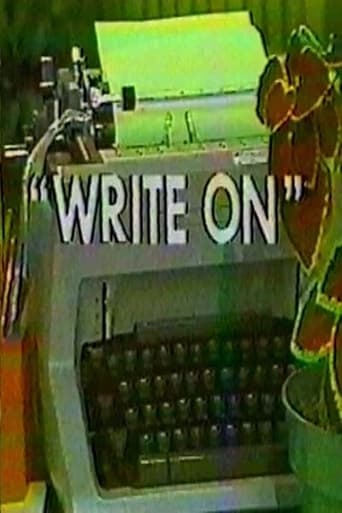Write On Season 1

Write On was an educational television show which was produced and broadcast by TVOntario. The series starred Jack Creley as Mr. R.H. Morton, Diane Dewey as Miss Newton, and Paul Brown as Henry Kent. The premise of the series is of the misadventures of the staff of a small newspaper under the editorship of the tyrannical Morton with his subordinates, Miss Newton the secretary and Henry Kent, a young reporter. Considering Kent has poor writing and grammatical skills for a professional journalist, the staff have numerous events that illustrate various lessons about writing. Furthermore, Kent often have equally educational daydreams where he is a dashing hero illustrating various writing concepts. Every episode of Write On was five minutes in length. They were written by Ken MacKay and Jed MacKay.
Watch NowWith 30 Day Free Trial!
Write On
1
Write On was an educational television show which was produced and broadcast by TVOntario. The series starred Jack Creley as Mr. R.H. Morton, Diane Dewey as Miss Newton, and Paul Brown as Henry Kent. The premise of the series is of the misadventures of the staff of a small newspaper under the editorship of the tyrannical Morton with his subordinates, Miss Newton the secretary and Henry Kent, a young reporter. Considering Kent has poor writing and grammatical skills for a professional journalist, the staff have numerous events that illustrate various lessons about writing. Furthermore, Kent often have equally educational daydreams where he is a dashing hero illustrating various writing concepts. Every episode of Write On was five minutes in length. They were written by Ken MacKay and Jed MacKay.
Watch Trailer
With 30 Day Free Trial!
Write On Season 1 Full Episode Guide
A distraught witch enters the offices in need of Henry and Miss Newton's help. No matter how she tries, the witch can't get her written commands to work her magic. It turns out all her commands were written with the word ""like,"" when it should be ""as.""
Mr. Morton reprimands Henry's quotation of the Mayor: ""No farther comment."" The paper will print the correct usage, if the Mayor did not say it. At the end of his diatribe, Morton asks Henry, ""What do you think this is, a game?"" This leads to Henry's daydream of a game show. He plays a contestant who must teach host Morton his mistakes.
It's time for both Miss Newton and Henry to fantasize a Cinderella story. This time, the grand prize goes to the girl who can distinguish the verbs sit from set and lay from lie.
Henry has left out all the hyphens in his story on an ex-general's peace policy. To prove his point, Morton moves his hand horizontally to simulate hyphens: ""Anti- (moves hand) tanks."" This prompts Henry's war dream as a wounded Captain Kent.
A tattooed lady named Irma Faust threatens to sue the newspaper over an advertisement. The eulogy of her husband, tattooed on her back, has misused quotation marks everywhere. Mr. Morton and Henry help to make the corrections before they get a call from the tattoo parlor. It turns out the tattoo is only a first draft , done in Magic Marker. With that, Irma Faust coaxes Mr. Morton to the parlor as a proofreader.
The newspaper has secretly plotted to replace both Henry Kent and Miss Newton with a professional named Peter Berton. He claims to know where to type commas in dates and addresses with his eyes closed. Henry challenges Berton, lending him the use of a faulty typewriter that can't print the comma. Mr. Morton goes belligerent at the site of Berton's apparent résumé and tells Henry to put it in the ""People Not to Hire"" file.
An acrophobic threatens to jump from the window near Henry's and Miss Newton's desks. Both of them ask to see his suicide note, which lacks a few commas. Once they correct the note, the poor man declines the opportunity to jump.
An organ grinder named Paolo Carbonara is searching for his monkey. It turns out the monkey walked out because he could not stand the sign on Paolo's back: ""A gift of dollar bills are greatly welcome."" Henry and Miss Newton convince Paolo to change the sign to ""A gift of dollar bills [b]is[/b] greatly welcome."" It's just what Paolo needs to win back the monkey's favor.
Mr. Morton has fired Henry because he was out of the office when a gorilla escaped from the zoo. But Morton's note to Henry reads (in part), ""A gorilla broke out of his cage with a bunch of bananas."" It's a misplaced modifier that Miss Newton and Henry correct, but not the last mistake. The gorilla shows up at the office, pointing out a misplaced modifier on the sign that stood at his zoo cage. Henry gets the sign corrected. This leads to a surprise for Mr. Morton.
What kind of rotten music is that English rock band playing? It's littered with sentences fused together with no periods, plus some badly-placed commas. Henry and Miss Newton tell band leader Slick Stagger that comma splices and fused sentences can't be expected to sell records. This leads to a spontaneous new song.
Mr. Morton reminds Henry that he is too inexperienced to gamble with sentence fragments. It prompts Henry to daydream of a Mississippi Riverboat showdown. To win Miss Newton, Henry must beat the sneaky Fragment Fred in a game of ""Five-Word Stud.""
Henry has written an incredibly superfluous sentence in his column whn, in short, he should have explained, ""As long as he lived, he loved her."" Morton warns him that he is using gobbledygook, language littered in ""government documents and the space agency."" That's too bad, because a UFO is about to crash into the Earth. The space agency sends the UFO an urgent message littered with gobbledygook, promting the UFO's plain response, ""Doesn't anyone [on Earth] speak English?"" Morton, Henry, and Miss Newton tell the space agency to send the message, ""Turn back before you destroy the Earth,"" which the UFO understands perfectly, and complies.
Miss Grouse, the garden columnist for the newspaper, is about to be relieved of her duties because she has re-used clichés in her work. Her dog groans at her very mention of a cliché. It is up to Henry to help Miss Grouse get a fresh approach to her column.
The first of Henry Kent's daydreams materializes when Morton chides him for not using specific nouns. In the dream, Henry is a famous surgeon who gives direction to befuddled compatriots.
Henry submits a poorly-written review of an opera. It lacks adverbs, implores Morton. But if the editor's remarks are bad enough for Henry, he must also deal with opera singer La Bellicosa, for it was her nephew's opera that Henry criticized.
Free Trial Channels
Seasons


























